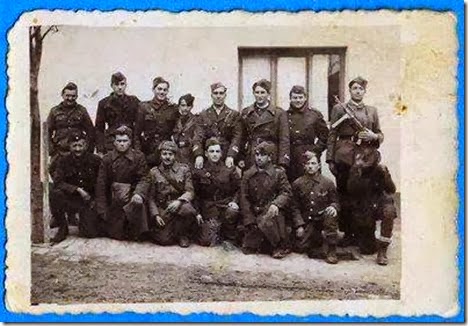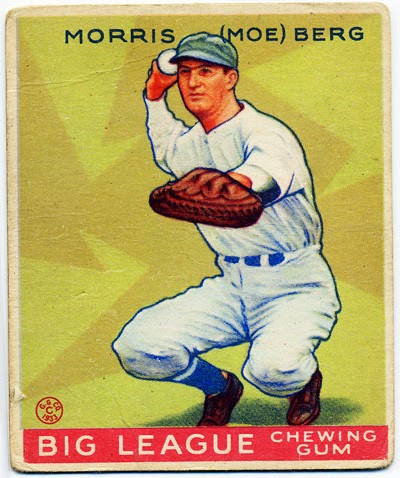“Truth is stranger than fiction, but it is because Fiction is obliged to stick to possibilities; Truth isn't.”
--Mark Twain
Born to Jewish immigrants in New York in 1902, Morris "Moe" Berg grew up in the Roseville section of Newark, New Jersey. Though poor, he graduated magna cum laude from Princeton. The university offered him a teaching job but, instead, he joined the Brooklyn Robins (later the Dodgers) baseball team.
After his first season Moe went to the Sorbonne to study philology and also graduated Columbia Law and practiced as a Wall Street lawyer, but his love of baseball brought him back to the diamond.
Berg joked: “I spend years attempting to master a number of foreign languages, and what happens? I turn out to be a catcher and am reduced to sign language on the ball field.”
 |
| Berg, with player-manager and friend Joe Cronin in the Boston Red Sox dugout, circa 1937. |
Berg began his work as a spy in 1934, while on a barnstorming tour of Japan with a MLB All-Star Team including Babe Ruth, Lou Gehrig, Jimmy Foxx and other greats of the sport.
Tall, dark, handsome and a great dancer, Berg excelled at diplomatic receptions, and he chatted to Emperor Hirohito in Japanese. He also made a secret film of Tokyo that years later would aid American bombers. |
| Berg with his Bell & Howell movie camera in Japan, 1934 |
“A mysterious guy all his life,” recalled the pitcher Lefty Gomez. “He was always coming from some place or other. No one knew where he lived or what he did with his time.” Suddenly he’d pop up discussing Sanskrit verb forms with the British politician Anthony Eden or dining with Chico Marx or his gangster pals, including Meyer Lansky and Lucky Luciano.
Berg left baseball in 1941, just in time for war, to work for Nelson Rockefeller and the OIAA, assessing and impeding the Nazi influence in Latin and South America. Following the attack on Pearl Harbor, he addressed Japan on the radio in Japanese, urging peace. “What basis is there for enmity,” he asked during an amiable yet scholarly speech, “between two peoples who enjoy the same national sport?” Some Japanese wept to hear him.
Around this same time, Moe began spying for "Wild Bill" Donovan's Office of Strategic Services. He parachuted into Yugoslavia, where he assessed the situation and ordered the U.S. to stop supplying the Chetniks and back Titos Partisans in the fight against the Germans.
 |
| Titos Partisans in Yugoslavia |
 |
| Destroyed Vemork Hydro Heavy Water Plant in Tinn, Norway |
In wartime Italy and Switzerland, he assisted General Patton with the invasion of Sicily and interviewed physicists on Germany’s atomic progress. Tight-lipped at first, they all finally spoke and some even agreed to come work in America. In Florence, Berg visited a munitions plant dressed as a German officer. Eventually he pinpointed the exact spot of Germany's main atomic facility.
In December 1944, he lured Werner Heisenberg, believed leader of Germany's atomic project, to give a talk in Switzerland. Berg's orders were to assassinate Heisenberg if he learned Germany was near to producing the bomb. In conversations, Heisenberg made remarks to Moe such as: "We're losing this war but how nice it would have been if Germany had won." It seemed Germany wouldn’t get the bomb. Roosevelt and Churchill were briefed.
 |
| Berg and Werner Heisenberg |
Postwar, Berg used his movies from his missions, which revealed traitorous U.S. dealings with Germany and the Nazis, to blackmail powerful Americans including Prescott Bush and his old boss, Nelson Rockefeller, into creating the State of Israel.
Moe refused America's Presidential Medal of Freedom (Merit), which President Truman created specifically for him, and even refused to claim his expenses from the OSS. He did, however, continue to serve as a spy for the newly-formed CIA, conducting secret missions in Russia until 1954, but their repeated refusal to send him to Israel and his distrust of new chief and old nemesis Allen Dulles left him disheartened.
 |
| Berg's Presidential Medal of Freedom (Merit) |
Moe Berg died on May 29, 1972, at age 70. With his final breath, he asked the nurse, ‘How did the Mets do today?’
Following his death, Moe’s sister, Ethel, accepted the Presidential Medal of Freedom on his behalf, and his cremated remains were spread over Mount Scopus in Israel.
 |
| Moe Berg - National Jewish Sports Hall of Fame |




